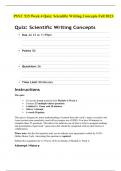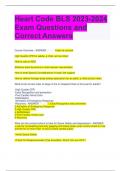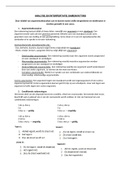Chapter 1: Background to the Study of Psychology
Meaning of psychology
The human being is the only creature that contemplates itself. We not only think, feel, dream,
and act, but also wonder how and why we do these things. A little more than a century ago,
human self- contemplation took a scientific turn, and we call that science psychology.
Psychology is the science of behaviour and the mind. Behavior refers to the observable actions
of a person or an animal. Mind refers to an individual’s sensations, perceptions, memories,
thoughts, dreams, motives, emotions, and other subjective experiences. Science refers to all
attempts to answer questions through the systematic collection and logical analysis of
objectively observable data. Behaviour is directly observable and the mind is not, but
psychologists often use data of behaviour to make inferences about the mind.
Psychology is also an applied discipline, one of the “helping professions.”
Three fundamental ideas for psychology; a historical overview
Three fundamental ideas for psychology are:
1 Behaviour and mental experiences have physical causes that can be studied scientifically.
2 The way people behave, think, and feel is modified over time by their experiences in their
environment.
3 The body’s machinery, which produces behaviour and mental experiences, is a product of
evolution by natural selection.
1. The Idea of Physical Causation of Behaviour
Until the eighteenth century, philosophy was tightly bound to and constrained by religion. The
church maintained that each human being consists of two distinct but intimately conjoined
entities, a material body and an immaterial soul. Today this is called dualism. The soul was
deemed responsible for the body’s heat, for its ability to move, for life itself.
Descartes challenged this view. Descartes’ conception of the mechanical control of movement
resembles our modern understanding of reflexes, which are involuntary responses to stimuli.
Descartes believed that even quite complex behaviours can occur through purely mechanical
means, without involvement of the soul, because any activity performed by humans that is
qualitatively no different from the behaviour of a nonhuman animal can, in theory, occur without
the soul. In Descartes’ view, the one essential ability that we have but dogs do not is thought,
which Descartes defined as conscious deliberation and judgment.
Descartes’ theory is popular among non-scientists even today because it acknowledges the roles
of sense organs, nerves, and muscles in behaviour without violating people’s religious beliefs or
intuitive feelings that conscious thought occurs on a non- physical plane.
As a philosophy, it stumbles on the question of how a nonmaterial entity (the soul) can have a
material effect, or how the body can follow natural law and yet be moved by a soul that does not.
Thomas Hobbes was going much further than Descartes. He argued that spirit, or soul, is a
meaningless concept and that nothing exists but matter and energy, a philosophy now known
as materialism. Conscious thought is purely a product of the brain’s machinery and therefore
subject to natural law.
Physiology: the study of the body’s machinery
One especially important development for the later emergence of psychology was an increased
understanding of reflexes. The basic arrangement of the nervous system was well understood by
the beginning of the nineteenth century.
, Nervous system: central nervous system and peripheral nerves that connect the central
nervous system to sense organs and muscles
Central nervous system: brain and spinal cord
Through experiments with animals, scientists began to learn about the neural connections that
underlie simple reflexes. Some of these physiologists began to suggest that all human behaviour
occurs through reflexes; that even so-called voluntary actions are actually complex reflexes
involving higher parts of the brain. This view is called reflexology.
Phrenology: developed by the German physician Franz Joseph Galt. Galt and his followers
believed that the mind consists of mental faculties that are located at specific sites in the brain.
2. The idea that the mind and behaviour are shaped by experience
Empiricism in seventeenth-century England: the idea that human knowledge and thought
derive ultimately from sensory experience. If we are machines, we are machines that learn.
Locke viewed a child’s mind as a blank slate and believed that experience serves as the chalk
that writes on and fills the slate. There is no “human nature” other than an ability to adapt one’s
behavior to the demands of the environment. According to the empiricists, the fundamental
units of the mind are elementary ideas that derive directly from sensory experiences and
become linked together, in lawful ways, to form complex ideas and thoughts.
The law of association by contiguity: If a person experiences two environmental events at the
same time or one right after the other, those two events will become associated in the person’s
mind such that the thought of one event will, in the future, tend to elicit the thought of the other.
John Stuart Mill referred to this sort of analysis of the mind as mental chemistry. Complex
ideas and thoughts are formed from combinations of elementary ideas, much as chemical
compounds are formed from combinations of chemical elements.
The opposite of empiricism is nativism; the view that the most basic forms of human knowledge
and the basic operating characteristics of the mind are inborn and do not have to be acquired
from experience. To learn anything, any entity must contain some initial machinery already built
into it. At a minimum, that machinery must include an ability to sense some aspects of the
environment, some means of interpreting and recording those sensations, some rules for storing
and combining those sensory records, and some rules for recalling them when needed.
Kant distinguished between a priori knowledge, which is built into the human brain and does
not have to be learned, and a posteriori knowledge, which one gains from experience in the
environment. Without the first, argued the nativists, a person could not acquire the second.
3. The idea that the machinery of behaviour and mind evolved through natural
selection
Charles Darwin published The Origin of Species, which provided a biological grounding for
psychology. Darwin’s fundamental idea was that living things evolve gradually, over generations,
by a process of natural selection. At each generation, random changes in the hereditary material
produce variations in offspring, and those variations that improve the chance of survival and
reproduction are passed from generation to generation in increasing numbers.
He argued that the basic forms of human emotional expressions are inherited, as are those of
other animals, and may have evolved because the ability to communicate one’s emotions or
intentions improves one’s chances of survival. Darwin helped convince the intellectual world
that humans are part of the natural world and can be understood through the methods of
science.











